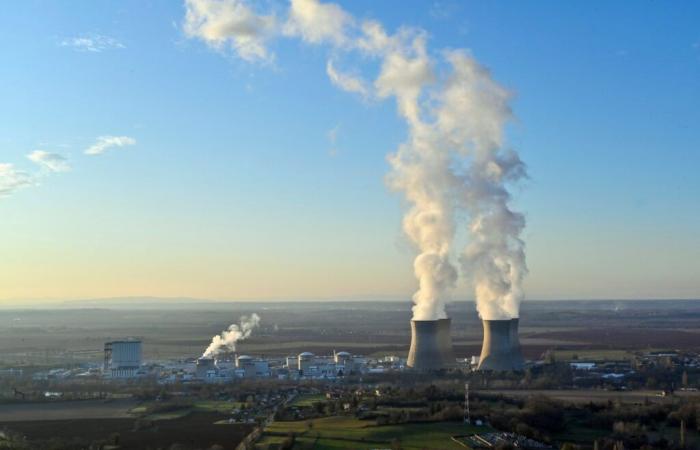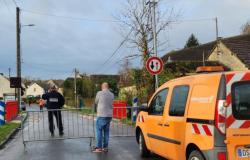
It was two years ago. Between the unavailability of five nuclear reactors affected by corrosion and the war in Ukraine, with its impact on Russian gas imports, the French electricity supply was in danger. Frightened by the risk of blackout (large-scale blackout), the government had increased prevention campaigns aimed at households.
Who has forgotten the famous slogan: “ I turn down (the heating), I turn off (the electrical appliances), I shift (my consumption times) », broadcast ad nauseam during winter 2022-2023? Ultimately, more fear than harm: thanks to rather mild weather, the worst was avoided. Two years later, the spots are back on our screens. But the electricity supply to the French should not be suspended by the weather. This is what emerges from the forecasts of the electric transport network manager (RTE).
According to the EDF subsidiary, “ the outlook for security of electricity supply appears very favorable » et « the risk of imbalance between supply and demand is low “. Conclusion, except “ exceptional situation “, the power supply should be ensured throughout the winter. This, even if some of the 56 French reactors will be temporarily unavailable for maintenance. “ On average over the winter, we should have 80 to 85% of our maximum production capacity », explains Emeric de Vigan, specialist in energy issues.
Several factors explain RTE's optimism, usually very cautious. First, the regained overall availability of the nuclear fleet, thanks to the repair of reactors subject to corrosion problems during the winter of 2022-2023. Another positive point, the great year for renewable energies, with record hydraulic production. But also well-filled gas stocks, in France and in Europe. Finally, a balance between supply and demand which has evolved significantly compared to before the energy crisis. “ Supply has increased but it is above all the drop in demand, 5 to 10% lower than what we experienced before the crisis, which allows RTE to be confident », pursued Emeric de Vigan.
Towards record exports?
The causes of this decline? Companies that have optimized their consumption to adapt to the surge in prices. And households burned by bills, who have more sober uses. The other side of the coin is that demand is also being dragged down by the bad luck of French industry. Some electro-intensive factories are not running. This is the case of Vencorex, the flagship of French chemistry. The 450 employees of the Isère site have been on strike since the company was placed in receivership.
The rest after this ad
Beyond self-sufficiency, the level of our winter electricity production must allow France to export. Towards our usual customers: Italy, the United Kingdom and especially Germany, which made the disastrous mistake of betting everything on renewable energy, which makes it dependent on Russian gas. “ Not only should we be able to sell electricity outside our borders all winter, but we are heading towards a record year for exports », welcomes Christophe Grudler, Renew MEP, who chairs the nuclear intergroup.
Everything is not yet rosy in the land of the atom, but France has at least found the path to energy independence. Today, the French electricity mix is 65% based on nuclear power. Gas is reduced to the bare minimum, while the share of renewables increases: hydraulic energy alone represents a little more than 10% of the mix, while wind and solar power rise to 15%. Despite this progress, renewables remain penalized by their intermittency. Renewable electricity is difficult to export because production peaks occur in summer, when demand is low. “ It’s difficult to integrate into the market, recognizes Christophe Grudler. In exchanges, supply must correspond to demand to the nearest kilowatt hour, which does not help in the case of renewables. »
France's energy salvation therefore depends above all on nuclear power. The former CEO of Elf and SNCF, Loïk Le Floch-Prigent, was convinced from the start: “ It is abundant, cheap and sovereign energy. Until we understand this, we cannot be a great country. » Has the political class, which aims for carbon neutrality in 2050 (one of the objectives of the Green Deal, the European green pact), understood this? After having assumed the closure of the Fessenheim site, requested by his predecessor, Emmanuel Macron took a pro-nuclear turn in the wake of the war in Ukraine. Since his re-election, the president has promised the construction of six to fourteen new nuclear reactors. Eight EPR 2 (new generation) have already been validated by the EDF board of directors.
They will be located on the Penly, Gravelines and Bugey sites. But ” they will not see the light of day before 2040 or 2045 », according to Christophe Grudler. It must be said that the investigation phase of each file with the Nuclear Safety Authority (ASN) lasts… at least three years! Enough to exasperate Loïk Le Floch-Prigent, who criticizes administrative burdens and bureaucracy: “ Installing power stations in five or six years, we did it, we can do it again. We don't have to wait twenty years. » Perhaps it is the sign of very French art to add a touch of complexity where there is not necessarily a need…
France





